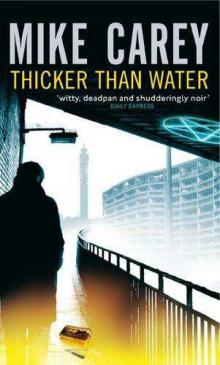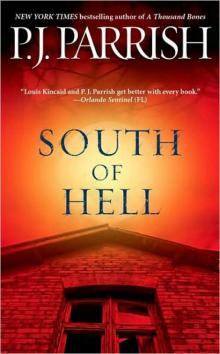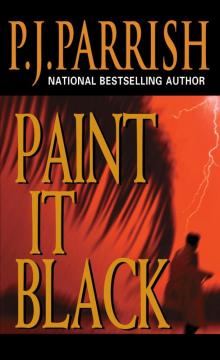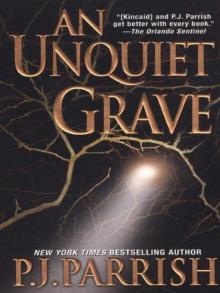- Home
- P J Parrish
Dead of Winter Page 4
Dead of Winter Read online
Page 4
Louis went to the center of the room. He thought he could still smell the scent of aftershave, hear the kids giggling. He closed his eyes and imagined the sound as the blast ripped through the door below. He saw Stephanie Pryce bolting upright in her bed. He turned and saw Jesse staring at him.
“You take this kind of personal, don’t you, Kincaid?”
“What do you mean?”
“I was watching you. It’s like you could see it in your head.”
“Sometimes it helps to try and get a feel for things,” Louis said. He saw something in the closet and went to it. Hanging there were two Loon Lake uniforms, still in their plastic dry cleaning wrappers.
“Damn, she just left them hanging here,” he said quietly.
Jesse came up behind him. “I should take these, I guess. Chief asked me to come get them two weeks ago.”
Louis moved to let Jesse gather up the uniforms, turning to survey the empty room again. He saw a curled photograph on the floor and reached down for it. It was of a small child, light-skinned with a tumble of black curls.
“Is this one of his kids?” Louis asked.
Jesse peered over Louis’s shoulder. “Yeah.”
Louis stared at the picture. “Is Mrs. Pryce white?”
“Yeah.”
“Did you guys consider that could be a motive?”
“Sure. The wife had an ex-husband that we thought was weird but the chief didn’t agree.”
“How long were the Pryces married?”
“Seven years.”
“Long time for an ex to stew about something,” Louis said, slipping the photograph in his pocket. He walked to the window and looked out at the street. There was a little girl making snow angels on the lawn across the street.
“What was Pryce like?” Louis asked.
“I told you. He kept to himself, so none of us really got to know him. He always seemed, I don’t know, uncomfortable with us. He was...intense, off in his own world, a classic Type A personality.”
Louis didn’t answer, his eyes still on the little girl.
“Personally, I always thought maybe he considered himself an outsider because he was black,” Jesse said.
Louis turned. “Was he?”
Jesse hefted up the uniforms. “Shit, no, not from our side,” he said. “I just always thought he needed to lighten up.”
“Lighten up?”
“Christ, Kincaid, you know what I mean. You know, like a guy might make a joke or something, about color or something, but they don’t mean anything by it. But Pryce never saw it from that point of view. He just couldn’t, you know...”
“Lighten up,” Louis said.
Jesse sighed. “No way am I going to get this right.”
“Okay, here’s a soft-ball pitch for you. What kind of cop was he?”
Jesse thought for a moment. “Civil, even to the dirtbags. He was the kind of cop that polished his badges, his buckles and probably his balls with Brasso.”
Louis smiled slightly. Jesse’s mouth curved up gratefully.
“Let’s get the fuck out of here,” Jesse said. “Chief’ll ream me a new asshole if he finds out we were here.”
Outside on the porch, Louis held the uniforms as Jesse pulled the door shut and tested it to make sure it was locked.
“Do you think the chief would let me see Pryce’s old case files?” Louis asked.
“What for?”
Louis shrugged. “A fresh pair of eyes maybe.”
Jesse slipped his sunglasses back on and stared at Louis. “We tried, Kincaid. We talked to local criminals, retired criminals, local mental cases, Pryce’s relatives. We even visited the Rambos up at Lake Orion.”
“Rambos?”
“You know, those weird Vietnam vets who live in the woods. Chief thought maybe they just decided to start popping cops. I’m telling you, we talked our asses off. And we didn’t find squat.” Jesse started down the porch.
“Jesse.”
He stopped and turned.
“I wasn’t implying you didn’t try.”
“Sounds like it.”
Louis hoisted the uniforms. “Sorry.”
Jesse turned and walked to the cruiser. Louis followed, laying the uniforms across the backseat. They drove in silence, heading back to Main Street.
Louis pulled the photograph of the Pryce kid from his pocket.
Jesse noticed him looking at it. “I keep thinking of his kids,” Jesse said quietly. “I keep thinking of those kids and hoping they didn’t come down those stairs.”
“Yeah,” Louis said.
They were silent again. The radio crackled as a call came for another unit to assist a man who had fallen on some ice.
“You know,” Jesse said, “more cops are killed during December than any other month.”
Louis didn’t respond. They headed back onto Main, starting into the business district.
“Hey,” Jesse said suddenly. “I almost forgot to show you the most important place in Loon Lake.”
He did a U-turn and pulled up to the curb. “Ground zero,” he said with a grin. “Dotty’s Blue Star Café. The state’s biggest deposit of natural gas.” He grabbed the mike. “Florence, this is L-13. We’re 10-7 for a few.”
Louis slipped the photograph back in his pocket. His mind was working back, replaying his job interview with Gibralter, wondering if the chief intended to appoint someone to take Pryce’s investigator job. If he himself had been interviewing for it, he wished Gibralter had mentioned it. Maybe Gibralter had been doing just that and he hadn’t picked up the clues. He had worked for only two men before. His first chief in Ann Arbor had been as easy to read as a telephone book. But his experience with the sheriff in Mississippi had told him that impressions and, worse, assumptions about character, could be dead wrong.
Gibralter...what in the world was he? Soldier? Scholar?
Louis shook his head. Whatever Brian Gibralter was, it was clear that beneath that starchy exterior buzzed a Byzantine brain.
A meeting of the minds. Shit, maybe that was why he had been hired.
CHAPTER 4
Louis lingered on the porch until the moon scuttled behind a cloud, then he went back inside the cabin. He stood for a moment, looking at his suitcase sitting on the bed then went to the kitchen. Grabbing a Heineken from the refrigerator, he popped it open and took a long drink as he surveyed his new home.
The placed was a little shabby but not bad for two hundred a month. The moment the real estate agent had unlocked the door Louis had liked the place. The furniture was utilitarian, standard-issue rental stuff. But the wood floors, rough-hewn walls and log-beamed ceiling had a certain rustic charm. It was the fireplace that had cinched it, though, a huge stone thing dusty with soot and cobwebs. The agent was barely out the door with the signed lease before Louis was out back gathering wood.
It took four tries but now a fire was blazing, softening the dark corners and dissipating the mildew smell with the sweet scent of burning wood. Louis looked down at the rug in front of the fireplace. It was a bear rug, dusty brown and pocked with moth holes. He had found it rolled up in the closet. It smelled like dirty sweat socks but he doused it with some foot powder from his ditty bag and it had settled down. The taxidermist had given the bear a maniacal grin, and as Louis stared down into the animal’s glassy eyes, he found himself smiling.
Damn, he liked this place.
He took a swig of the beer. Settling down the bottle, he went outside to get some more firewood.
It was quiet — no wind, no animal sounds. He stopped, staring out at the frozen lake. The strong pine scent pricked his nostrils, reminding him for a moment of Mississippi. But the air was different here, cleaner, fresher, like just taking it in made you healthier.
As he gathered up logs, he thought of the portrait of Pryce back at the station. The irony of his situation was almost too strange. He had landed again in a small town, this time replacing another young cop. A black cop. A black cop who wore size sixtee
n shirts and spit polished his badge. Louis shivered and started back to the front of the cabin.
He heard footsteps and stopped. He turned and saw a figure out near the shoreline. He strained in the half-light of the moon, but could only make out a silhouette. It was a jogger, a girl. She was short and slender, and her ponytail bounced rhythmically with each stride. He watched her until she disappeared into the pines then he went back inside. What kind of place was this that a girl could feel safe enough to jog alone at night?
Inside, he dropped logs on the hearth. Standing to arch his back, his eye caught the photograph of the Pryce boy sitting on the mantel.
A meeting of the minds...Well, if Jesse was any indication, Gibralter wasn’t happy with the way the Pryce case had been handled so far. Maybe he would welcome a new perspective. What did he have to lose? He wanted to work the case and there was only one way to get to it: Come right out and ask.
He glanced at his watch. Just after nine. Jesse had said that Gibralter stayed late at the station. He grabbed his keys and University of Michigan jacket and headed out.
There was no one manning the dispatch desk when Louis got to the station. A steaming mug of coffee, a paperback and a bag of Pepperidge Farm Milano cookies told him Edna had temporarily abandoned her post.
Louis went to Gibralter’s door, tapped on the glass and poked his head in. The chief looked up quickly.
Louis continued on in. “Good evening, sir, I — ”
Gibralter slammed a drawer shut. “Kincaid, are you a mental deficient?”
Louis stopped cold. “Sir?”
“Why the hell didn’t you knock? I told you when I hired you don’t enter without knocking.”
Louis looked back at the door. “I did, sir.”
“In polite society, people wait for permission to enter.”
“My apologies.”
Gibralter glared at him and as quickly as it had come, the anger faded. “I don’t normally give second chances but I’m not going to suspend you.”
“Thank you, sir.”
Gibralter lit a cigarette and blew out the smoke in one blue stream that seemed to fill the room. “You’re out of uniform,” he said.
“Sorry, sir,” Louis said. “It won’t happen again.”
Gibralter sat down in the large swivel chair behind his desk. “Now, what did you want?”
Damn, he had forgotten the nice little speech he had rehearsed on the drive over. “Well, sir,” he began, “I was thinking tonight — ”
“Thinking?”
“Yes, sir, and — ”
“‘To him whose elastic and vigorous thought keeps pace with the sun, the day is perpetually morning.’” Gibralter smiled. “Thoreau. You ever read Thoreau?”
Louis shifted slightly, clasping his hands behind his back. “Yes, in college.”
“Interesting man, wouldn’t you say?”
Louis tried to remember something impressive from his philosophy course. It had been senior year, a three-credit slam-dunk course he needed for graduation and he had slept through it.
“Well, sir, I think his philosophy was admirable.”
Gibralter cocked an eyebrow. “Oh? So you’re a Transcendentalist, are you?”
A snippet from a forgotten lecture drifted into Louis’s head.
“Thoreau believed in the basic good of man. And the strength of the individual. I believe in those things, sir.”
“I’m sure you do,” Gibralter said, leaning forward to snuff out his Camel. “‘Nothing is at least sacred but the integrity of your own mind.’ But that was Emerson, wasn’t it?”
Louis unclasped his hands, realizing suddenly he looked like he was standing at attention.
“Well, I don’t find much to admire in Thoreau’s philosophy myself,” Gibralter said.
So much for a meeting of the minds.
“A belief that intuition is better than logic and reason? The idea that man should turn his back on authority and established order?” Gibralter shook his head, smiling again. “The man ran off and lived in the woods but wouldn’t even set a trap or own a gun.”
Louis’s eyes dropped to the red carpet. How in the hell was he going to turn this around to asking for the Pryce case?
“I understand you were at the Pryce house today,” Gibralter said.
Louis looked up. “Yes, it’s tragic. Jesse said — ”
“It’s more than tragic. It’s a goddamn outrage. No one kills my cops and gets away with it.”
Gibralter reached into a drawer and pulled out a fresh pack of Camels. He slowly peeled off the top and then held the pack out to Louis.
“I don’t smoke,” Louis said.
Gibralter pulled out one, lit it and sat back in his chair. “You came here to ask for the Pryce case, didn’t you?” he said, squinting up at Louis through the smoke.
“Yes, sir,” Louis said.
“Why?”
“The house, the scene bothered me,” Louis began. He reached in his jacket. “I found this picture — ”
“Let me see it.”
Louis gave it to him. Gibralter glanced at it then tossed it on the desk. “Emotions can get in the way in this job,” he said.
“Sometimes they can be powerful motivators,” Louis said.
“What did you feel when you saw that?” Gibralter asked, nodding at the photograph.
“Anger,” Louis replied.
“What else?”
Louis hesitated. “Frustration.”
“What else?”
Louis stared at Gibralter.
Gibralter took a slow drag on his cigarette. “So,” he said, “what makes you think you can work this case when none of my other men has been able to come up with anything?”
The office was very warm. Louis felt a trickle of sweat make its way down his forehead. Shit, he didn’t want this man seeing him sweat.
“Sir, I wouldn’t think to question the ability of anyone here,” he said. “But I was made aware of the fact that the case isn’t going anywhere and that you have not delegated it to — ”
“Stop with the bullshit, Kincaid. Why do you want the case?”
Louis wet his lips. “I want to see the man caught.”
Gibralter considered him carefully then smiled. “And you can’t see yourself answering calls for lost dogs and downed geriatrics for the rest of your career here.”
Louis felt a small spasm of anger.
“That’s all right, Kincaid,” Gibralter said. “Ambition is good in a man. I wish all my men had ambition.” Gibralter was silent for a moment. “Tell me something,” he asked finally. “Do you think a college degree is a help or a handicap for a police officer?”
Now how was he supposed to answer this one? His eyes darted up to the wall with all the certificates. No nicely framed diploma from Stanford in all that police stuff.
“I think it makes some people suspicious,” Louis said.
“Suspicious? Why is that?”
“Other cops, I mean, sir. They might see it as...unnecessary, given the day-to-day demands of the job.”
“Clear thinking is unnecessary?”
“That’s not what I meant. I meant — ”
Gibralter held up a hand. “I know what you meant.”
Louis waited, hoping the man wasn’t going to ask him why he had decided to become a cop. Sometimes he wasn’t even sure himself. When his foster mother had asked him why, just before he went into the academy, he had laughed it off with a crack about girls liking men in uniforms. But what had really triggered his decision? The kindness of the cop who revived the Patterson baby after he fell in the neighbor’s pool? Or had it been the meanness of the cop who clubbed his roommate after finding pot in his car?
It was something more visceral. Flickering images on the Zenith. Black smoke, black faces. Orange fires, blue uniforms. Had his eight-year-old mind understood the rioting going on so many miles away in downtown Detroit? Probably not. But something about those uniforms had stuck.
A p
hone rang outside and he heard Edna’s nasal voice answering. The wall clock ticked off the seconds. A twig beat against the window. The silence lengthened. Louis focused on the window, watching a droplet weave a slow pattern through the condensation.
“I want that cocksucker caught,” Gibralter said softly.
Louis looked back at Gibralter.
“I want him caught. I want him put behind bars,” Gibralter said. “This state doesn’t have capital punishment but I’d like to see him strapped in a chair, hear him scream and see him shit in his pants when the smoke pours off his head.. I want him to pay.”
Louis was locked by pull of the chief’s icy eyes. Finally, Gibralter blinked and looked away. “I’m putting you on the case,” he said.
Louis nodded. “I’ll give it my best.”
Gibralter stood up slowly. “You’re still green, Kincaid. Two years total as a working officer. And I don’t want you neglecting regular duties. You’ll still pull patrol like everyone else.”
Gibralter’s expression had shifted slightly. His eyes burned like gas-blue flames but there was something slack, almost weary around his mouth. “When one cop dies, we all die,” he said.
Louis nodded once, sensing Gibralter expected no reply.
Gibralter opened a drawer and pulled out a plastic bag sealed with a wide band of orange evidence tape. “You’ll need this,” he said. Gibralter also picked up the photograph of Pryce’s child and handed both items to Louis.
“You’re dismissed, Kincaid,” Gibralter said. He turned his back, looking out the dark window.
Louis slipped the photograph and the evidence bag in his jacket and started to the door.
“Kincaid.”
He turned back. Gibralter was still facing the window. “That other feeling you had when you saw the picture?” Gibralter said. “It was fear.”
Louis paused, hand on the doorknob. “‘If a man hasn’t discovered something that he will die for, he isn’t fit to live,’” he said.
Gilbralter looked up. “Churchill?” he asked.
“No, sir,” Louis said. “Martin Luther King, Jr.”

 South of Hell (Louis Kincaid Mysteries)
South of Hell (Louis Kincaid Mysteries) Thicker Than Water
Thicker Than Water Dead of Winter
Dead of Winter The Damage Done
The Damage Done South Of Hell lk-9
South Of Hell lk-9 A Killing Rain
A Killing Rain Dead of Winter lk-2
Dead of Winter lk-2 Island of Bones
Island of Bones Paint It Black
Paint It Black An Unquiet Grave (Louis Kincaid Mysteries)
An Unquiet Grave (Louis Kincaid Mysteries) She's Not There
She's Not There